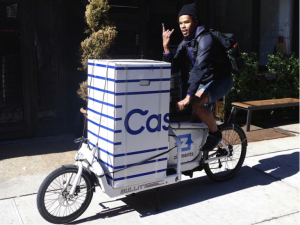Dude, no one will ever buy that online. AKA how incumbents get pwned in tech.
I’m blessed to work at Chicago Ventures with some extraordinary people who are continually pushing me to evaluate whether I’m too accepting of the status quo, challenging me to re-imagine the future, and, ultimately, the types of investments we make. Most recently my colleague Pat Ryan Jr. pointed me to a recent Fred Wilson blog, Don’t Automate, Obliterate, and the corresponding Harvard Business Review article. Tl;dr? Cliff notes are that it’s far more valuable to re-imagine an industry from the ground up rather than trying to build an efficiency focused, automated piece of software on top of it. Two examples: Instead of building call routing and dispatch software for the taxicab industry, re-imagine the taxi industry as P2P ride sharing, a la Uber. Or, instead of building document management software for the legal industry, fundamentally re-consider what the legal world might look like under a crowd-sourced model, for example UpCounsel.
The whole discussion reminded me of a conversation I had with a well known VC about three years ago in NYC. In it, he reminded me that in the early days of e-commerce, shoes were considered an untouchable category – “who would ever buy shoes online? You need to try to them on!” And they remained elusive until Zappos came along and offered a seemingly implausible value prop: what if we were to ship you unlimited shoes for free? Let you keep them for a year to try them out? And then let you return them for free? We all know how that story turned on.
Similarly, he noted at the time, furniture – sofas, mattresses, tables, etc – were one of those categories that hadn’t been cracked by e-commerce. The unit economics made delivery expensive. And, like shoes, consumers wanted to try them on. Is it comfortable? Do the colors match up with room palette? What if, he proposed at the time, a furniture company offered the following value prop: We’ll show up at your home, for free, with ten different sofas of varying feels and colors, let you try them all out for free, and then just keep the one you want and send all the rest back for free?
Compelling. But entirely impractical, if not outright impossible. Right?
Enter Casper.
If you’re not aware of Casper, they’re a web-only millennial focused mattress company promising free delivery within 90 minutes in NYC, a 100-day try out policy, and free-returns (for any reason) if you’re unhappy. Oh, and they’re a fraction of the cost of traditional Serta, Stearns&Foster, Tempurpedic mattresses. Oh, and they come with a 10-year warranty. Oh, and the reviews are off the charts. Oh, and it goes on and on.
Casper actually was an impossibility. Until very recently. Its success is a combination of the availability of low cost on-demand delivery (powered by Zipments no less! [Disclosure: Chicago Ventures is an investor in Zipments]), reduced costs via vertical integration, and innovative customer acquisition channels. Most importantly, Casper is evolving into a lifestyle brand.
Casper exists because its founders elected to challenge incumbent assumptions about what a mattress felt like, how it could be purchased and what it would cost. While their new assumptions were, even recently, implausible, they are now entirely actual.
It is similar to a refrain that famed angel investor Gil Penchina likes to use: “What has fundamentally changed about the world today that enables your business to succeed when all previous attempts have failed?”
As an investor, I am continually scouring the ecosystem for founders who are challenging incumbent assumptions and looking to reimagine industries. Just like it was once considered impossible to disrupt the floral wire services because of their mass marketing spend, David, Farbod & Gregg at Bloomnation challenged that belief by asserting that florists themselves, if empowered with proper tools, could side-step these incumbent middlemen. And they are winning. And florists love them.
Trying to accomplish the impossible can be dangerous – hell, often delusional. But if you’re challenging incumbents because you’ve noticed a shift in the axioms they depend on for success, I’d love to chat.

